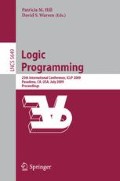Abstract
Due to the development of efficient solvers, declarative problem solving frameworks based on model generation are becoming more and more applicable in practice. However, there are almost no tools to support debugging in these frameworks. For several reasons, current solvers are not suitable for debugging by tracing. In this paper, we propose a new solver algorithm for one of these frameworks, namely Model Expansion, that allows for debugging by tracing. We explain how to explore the trace of this solver in order to quickly locate a bug and we compare our debugging method with existing ones for Answer Set Programming and the Alloy system.
Access this chapter
Tax calculation will be finalised at checkout
Purchases are for personal use only
Preview
Unable to display preview. Download preview PDF.
References
Chang, F.: Alloy analyzer 4.0 (2007), http://alloy.mit.edu/alloy4/
Denecker, M., Ternovska, E.: A logic of nonmonotone inductive definitions. ACM Trans. Comput. Log. 9(2) (2008)
Denecker, M., Vennekens, J.: Well-founded semantics and the algebraic theory of non-monotone inductive definitions. In: Baral, C., Brewka, G., Schlipf, J. (eds.) LPNMR 2007. LNCS, vol. 4483, pp. 84–96. Springer, Heidelberg (2007)
Ducassé, M.: Opium: An extendable trace analyzer for prolog. J. Log. Program. 39(1-3), 177–223 (1999)
East, D., Truszczynski, M.: Predicate-calculus-based logics for modeling and solving search problems. ACM Trans. Comput. Log. 7(1), 38–83 (2006)
Gebser, M., Pührer, J., Schaub, T., Tompits, H.: A meta-programming technique for debugging answer-set programs. In: Fox, D., Gomes, C.P. (eds.) AAAI, pp. 448–453. AAAI Press, Menlo Park (2008)
Jackson, D.: Software Abstractions: Logic, Language, and Analysis. The MIT Press, Cambridge (2006)
Jahier, E., Ducass, M., Ridoux, O.: Specifying prolog trace models with a continuation semantics. In: Lau, K.-K. (ed.) LOPSTR 2000. LNCS, vol. 2042, p. 165. Springer, Heidelberg (2001)
Langevine, L., Ducassé, M., Deransart, P.: A propagation tracer for gnu-prolog: From formal definition to efficient implementation. In: Palamidessi, C. (ed.) ICLP 2003. LNCS, vol. 2916, pp. 269–283. Springer, Heidelberg (2003)
Mallet, S., Ducassé, M.: Generating deductive database explanations. In: ICLP, pp. 154–168 (1999)
Mariën, M., Gilis, D., Denecker, M.: On the relation between ID-Logic and Answer Set Programming. In: Alferes, J.J., Leite, J.A. (eds.) JELIA 2004. LNCS, vol. 3229, pp. 108–120. Springer, Heidelberg (2004)
Mariën, M., Wittocx, J., Denecker, M.: The IDP framework for declarative problem solving. In: LaSh 2006, pp. 19–34 (2006)
Mariën, M., Wittocx, J., Denecker, M., Maurice, B.: SAT(ID): Satisfiability of propositional logic extended with inductive definitions. In: Kleine Büning, H., Zhao, X. (eds.) SAT 2008. LNCS, vol. 4996, pp. 211–224. Springer, Heidelberg (2008)
Meier, M.: Debugging constraint programs. In: Montanari, U., Rossi, F. (eds.) CP 1995. LNCS, vol. 976, pp. 204–221. Springer, Heidelberg (1995)
Mitchell, D., Ternovska, E.: A framework for representing and solving NP search problems. In: AAAI 2005, pp. 430–435. AAAI Press/MIT Press (2005)
Nilsson, H.: Tracing piece by piece: Affordable debugging for lazy functional languages. In: ICFP, pp. 36–47 (1999)
Pontelli, E., Son, T.C.: Justifications for logic programs under answer set semantics. In: Etalle, S., Truszczyński, M. (eds.) ICLP 2006. LNCS, vol. 4079, pp. 196–210. Springer, Heidelberg (2006)
Shapiro, E.Y.: Algorithmic Program Debugging. MIT Press, Cambridge (1983)
Shlyakhter, I., Seater, R., Jackson, D., Sridharan, M., Taghdiri, M.: Debugging overconstrained declarative models using unsatisfiable cores. In: ASE-18, pp. 94–105 (2003)
Syrjänen, T.: Debugging inconsistent answer set programs. In: NMR 2006, Lake District, UK, May 2006, pp. 77–84 (2006)
Tronçon, R., Janssens, G.: A delta debugger for ilp query execution. In: CoRR, abs/cs/0701105 (2007)
Van Gelder, A., Ross, K.A., Schlipf, J.S.: The well-founded semantics for general logic programs. Journal of the ACM 38(3), 620–650 (1991)
Author information
Authors and Affiliations
Editor information
Editors and Affiliations
Rights and permissions
Copyright information
© 2009 Springer-Verlag Berlin Heidelberg
About this paper
Cite this paper
Wittocx, J., Vlaeminck, H., Denecker, M. (2009). Debugging for Model Expansion. In: Hill, P.M., Warren, D.S. (eds) Logic Programming. ICLP 2009. Lecture Notes in Computer Science, vol 5649. Springer, Berlin, Heidelberg. https://doi.org/10.1007/978-3-642-02846-5_26
Download citation
DOI: https://doi.org/10.1007/978-3-642-02846-5_26
Publisher Name: Springer, Berlin, Heidelberg
Print ISBN: 978-3-642-02845-8
Online ISBN: 978-3-642-02846-5
eBook Packages: Computer ScienceComputer Science (R0)

